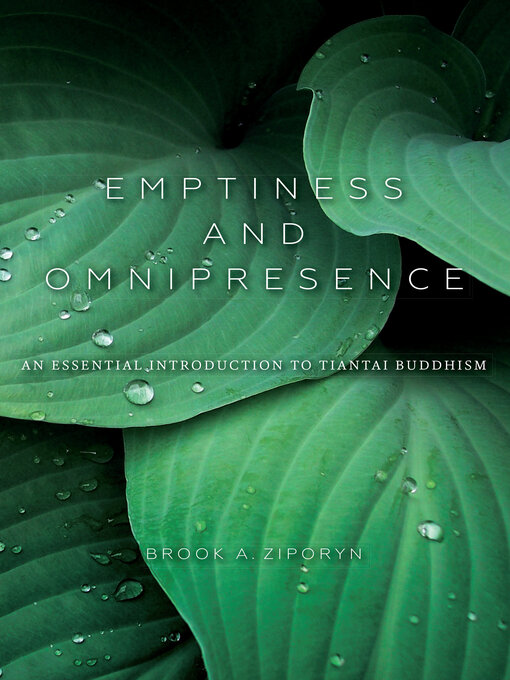Tiantai Buddhism emerged in sixth century China from an idiosyncratic and innovative interpretation of the Lotus Sutra. It went on to become one of the most complete, systematic, and influential schools of philosophical thought developed in East Asia. In Emptiness and Omnipresence, Brook A. Ziporyn puts Tiantai into dialogue with modern philosophical concerns to draw out its implications for ethics, epistemology, and metaphysics.
Ziporyn explains Tiantai's unlikely roots, its positions of extreme affirmation and rejection, its religious skepticism and embrace of religious myth, and its view of human consciousness. Ziporyn reveals the profound insights of Tiantai Buddhism while stimulating philosophical reflection on its unexpected effects.
-
Creators
-
Series
-
Publisher
-
Release date
December 22, 2021 -
Formats
-
Kindle Book
-
OverDrive Read
- ISBN: 9780253021205
- File size: 6805 KB
-
EPUB ebook
- ISBN: 9780253021205
- File size: 6805 KB
-
-
Languages
- English
-
Reviews
-
Publisher's Weekly
March 14, 2011
Photographs of personable stuffed creatures, handmade by Oles, appear in photographs with brief imperative phrases for each letter of the alphabet. "Eat the crust for me," requests a yellow and floral-printed bear with a red button nose. A cat in a pink, lacy dress insists, "Outfit me," while a green bear with a thermometer in its mouth peeks from beneath a blanket: "Take care of me." Enhanced with digital
accessories throughout, Oles's goggle-eyed dolls make for whimsically goofy stars, delivering the cozy message about protection, love, and commitment. All ages. -
Publisher's Weekly
April 11, 2016
Ziporyn, professor of ancient and medieval Chinese religion and philosophy at the University of Chicago, offers a casual but dense introduction to the lesser-known Tiantai school of Buddhism. He examines the philosophical and religious ideas within the Lotus Sutra and three representative figures of the school: Tiantai Zhiyi, Jingxi Zhanran, and Siming Zhili. Tiantai’s basic premises are jarring and seem blasphemous for those acquainted with popular understandings of Buddhism: “Buddhahood inherently includes every form of evil,” and each experience includes all other possible experiences interpreted in all possible ways; dwelling more deeply in suffering and delusion leads to liberation and freedom. By explaining Tiantai Buddhism’s radically paradoxical conception of a holistic, monistic universe, Ziporyn reveals the Tiantai understanding to be underpinned by emptiness as ontological and illimitable ambiguity. He aims for an introduction “divested of both technical detail and philosophical baggage” and succeeds for the most part; readers are, however, expected to be very comfortable with dense theoretical investigation. Those who take the journey with Ziporyn will find a rich and rewarding work, not simply due to the mind-boggling Tiantai doctrine, but also because of Ziporyn’s respect for the tradition and his extraordinary finesse in presenting its demanding ideas.
-
Loading
Why is availability limited?
×Availability can change throughout the month based on the library's budget. You can still place a hold on the title, and your hold will be automatically filled as soon as the title is available again.
The Kindle Book format for this title is not supported on:
×Read-along ebook
×The OverDrive Read format of this ebook has professional narration that plays while you read in your browser. Learn more here.

